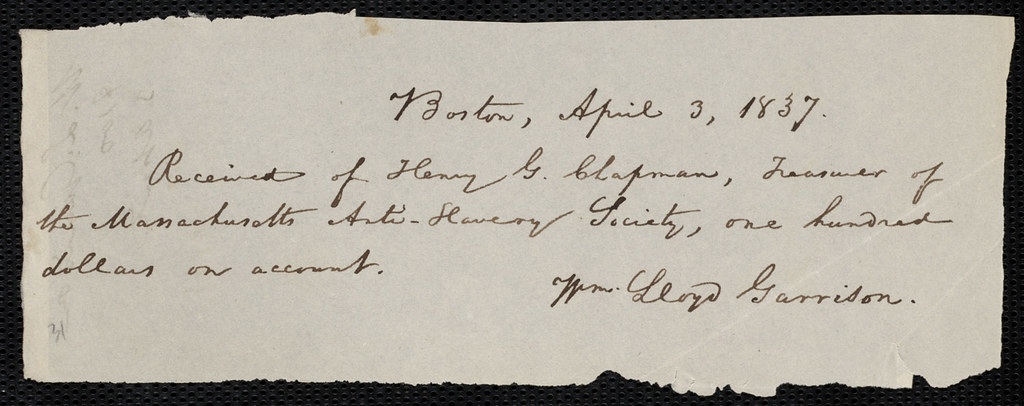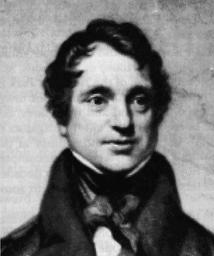LONDON, April 20, 1848.
Dear Lydian,
The steamer is in: everybody has letters, and I have none, none from you or the dear little Ellen who writes me short, pert, good notes, all blessings fall on the child! It must be that you too have decided that boats run a little too often for mere human pens moved by hands that have many more things to drive. . . .
I have been busy during the last fortnight, but have added no very noticeable persons to my list of acquaintances. A good deal of time is lost here in their politics, as I read the newspaper daily, and the revolution, fixed for the 10th instant, occupied all men's thought until the Chartist petition was actually carried to the Commons. And the rain, too, which falls at any time almost every day, these things, and the many miles of street you must afoot or by 'bus or cab achieve to make any visit, put me, who am, as you know, always faint-hearted at the name of visiting, much out of the humor of prosecuting my social advantages.
I have dined with Mr. and Mrs. Lyell one day, and one with a good Dr. Forbes, who carried me to the Royal Institution to hear Faraday, who is reckoned the best lecturer in London. It seems very doubtful whether I shall read lectures here even now. Chapman makes himself very busy about it, and a few people, and I shall, no doubt, have a good opportunity, but I am not ready, and it is a lottery business, and I do much incline to decline it, on grounds that I can only tell you of at home, and go to Paris for a few weeks, get my long-promised French lesson, and come home to be poor and pay for my learning. I have really been at work every day here with my old tools of book and pen, and shall at last have something to show for it all.
The best sights I have seen lately are, the British Museum, whose chambers of antiquities I visited with the Bancrofts on a private day, under the guidance of Sir Charles Fellowes, who brought home the Xanthian marbles, and really gave us the most instructive chapter on the subject of Greek remains that I have ever heard or read of. ... Then the King's Library, which I saw under the guidance of Panizzi, the librarian, and afterwards of Coventry Patmore, a poet, who is a sub-librarian. Then I heard Grisi the other night sing at Covent Garden, Grisi and Alboni, the rivals of the opera.
Being admitted an honorary member of the Reform Club, I went over all that magnificent house with Mr. Field, through its kitchen, reckoned the best in Europe, which was shown to me by Soyer, renowned in the literature of saucepan and soup. Another day through, over, and under the new Houses of Parliament, . . . among the chiefest samples of the delight which Englishmen find in spending a great deal of money. Carlyle has been quite ill lately with inflamed sore throat, and as he is a very in-tractable patient, his wife and brother have no small trouble to keep him in bed or even in the house. I certainly obtained a fairer share of the conversation when I visited him. He is very grim lately on these ominous times, which have been and are deeply alarming to all England.
I find Chapman very anxious to establish a journal common to Old and New England, as was long ago proposed. Froude and Clough and other Oxonians and others would gladly conspire. Let the Massachusetts Quarterly give place to this, and we should have two legs and bestride the sea. But what do I, or what does any friend of mine in America, care for a journal? Not enough, I fear, to secure any energetic work on that side. . . . 'T is certain the Mass. Q. R. will fail unless Henry Thoreau and Alcott and Channing and Charles Newcomb the four — old-visaged four — fly to the rescue.
I am sorry that Alcott's editor, the Dumont of our Bentham, Baruch of our Jeremiah, is so slow to be born. . . .
Young Palgrave at Oxford gave me a letter to Sir William Hooker, who presides over Kew Gardens, and Mr. and Mrs. Bancroft having a good will to go there, and being already acquainted with him, we went thither yesterday in their carriage, and had the benefit of this eminent guide through these eminent gardens. The day was the finest of the year, and the garden is the richest on the face of the earth. Adam would find all his old acquaintances of Eden here.
Since I have been in London I have not earned a single pound. The universal anxiety of people on political and social dangers makes no favorable theatre for letters and lectures. The poor booksellers sell no book for the last month. Neither have I yet had any new chapters quite ripe to offer for reading to a private class. But all this question must very shortly decide itself. Either I shall undertake something in London, or go to Liverpool or to Bristol, as has been proposed, or renounce all such thought, and determine to pay for my pleasures by publishing my new papers when I get home.
My newest writing (except always an English journal which grows a little day by day) is a kind of "Natural History of Intellect;" very unpromising title, is it not? and, you will say, the better it is, the worse. I dined with the Geological Club yesterday, and in the evening attended the meeting of the Society, and had a very good opportunity of hearing Sedgwick, who is their best man, Ramsay, Jukes, Forbes, Buckland, and others.
To-day I have heard Dr. Carpenter lecture at the Royal Institution. . . .
Dear love to all the children three, and to dear friends whom I do not begin to name for fear to choose. I never name any without a sense of crying injustice, so multitudinous are my debts, happy, unhappy man that I am! Fare you well.Waldo









Some images from Alexis Soyer’s book The gastronomic regeneration, a simplified and entirely new system of cookery with nearly two thousand practical receipts; illustrated with numerous engravings and correct and minute plans how kitchens of every size are to be constructed and furnished (Simpkin, Marshall & Co., 1849).















Some sources:
A memoir of Ralph Waldo Emerson, by James Elliot Cabot (Cambridge, Printed at the Riverside Press, 1887)
The gastronomic regeneration, a simplified and entirely new system of cookery with nearly two thousand practical receipts; illustrated with numerous engravings and correct and minute plans how kitchens of every size are to be constructed and furnished (Simpkin, Marshall & Co., 1849)




No comments:
Post a Comment